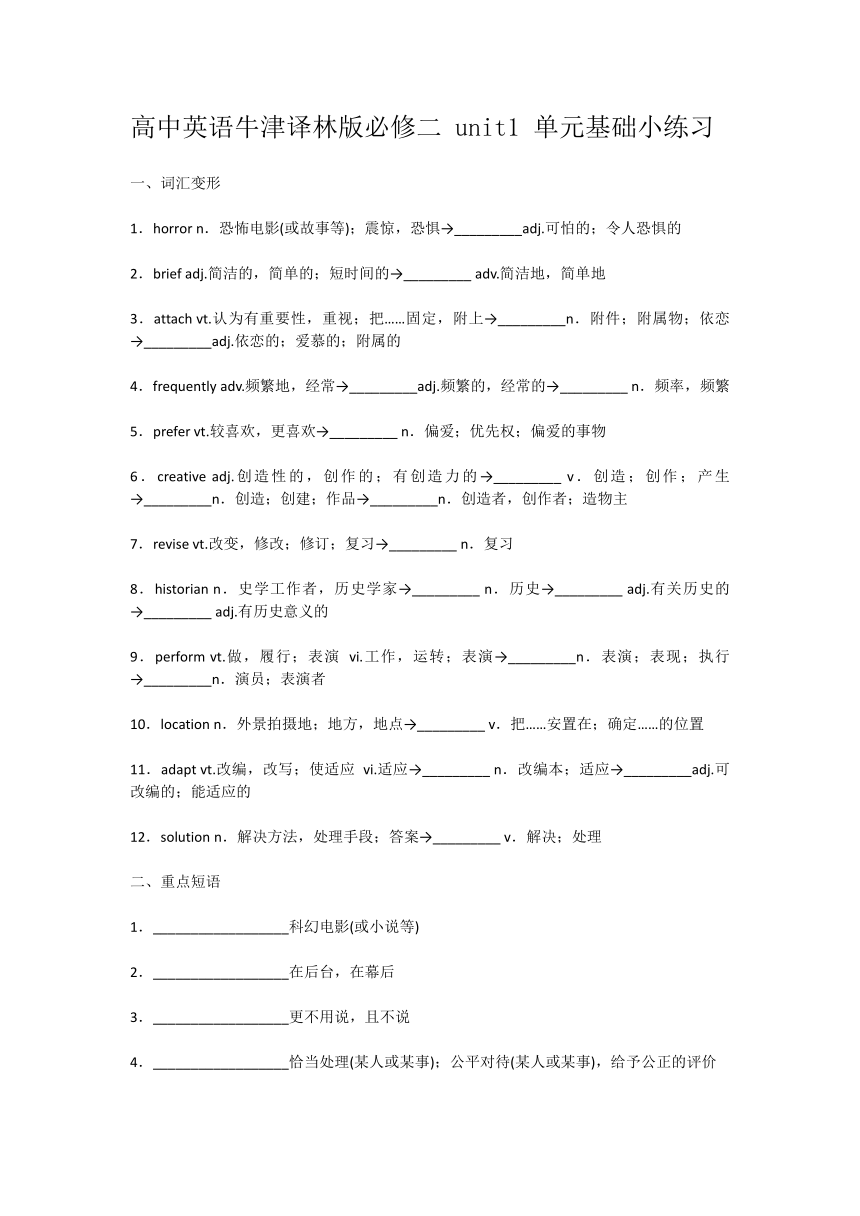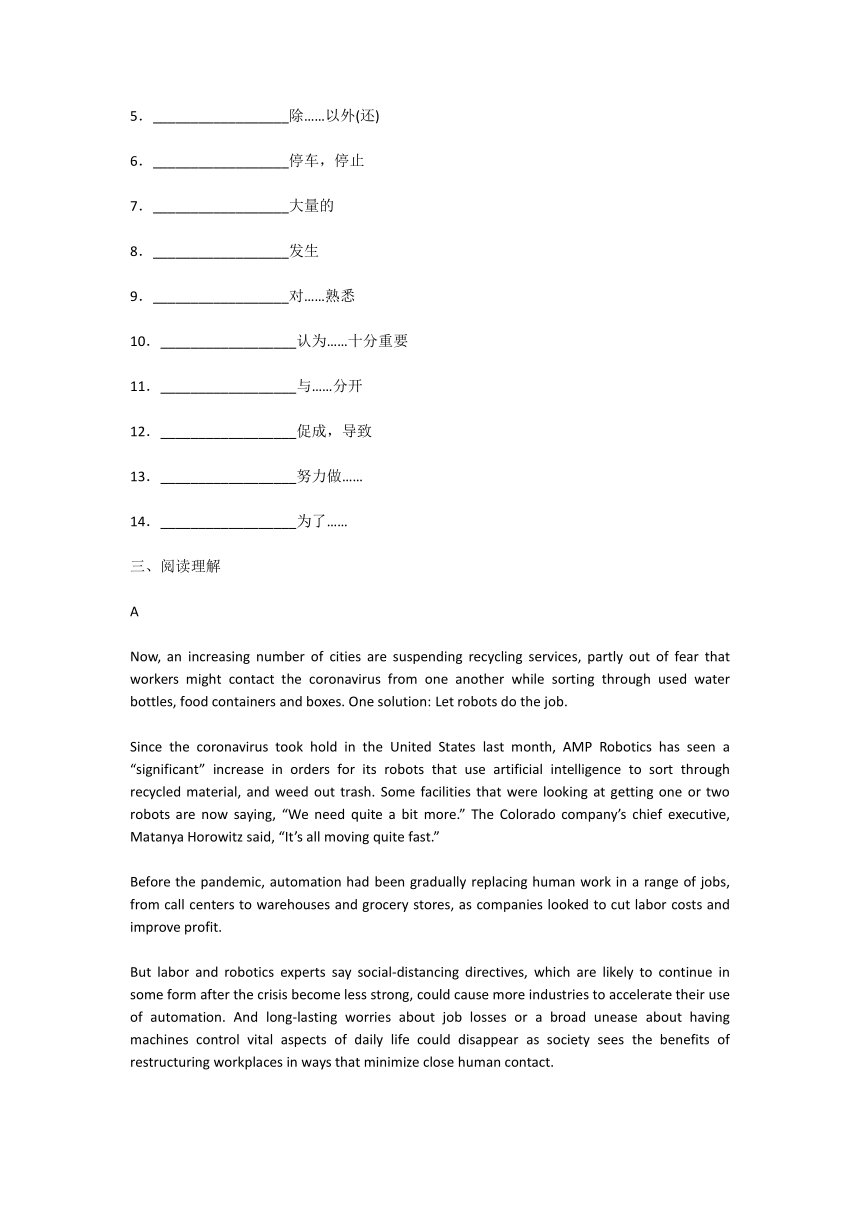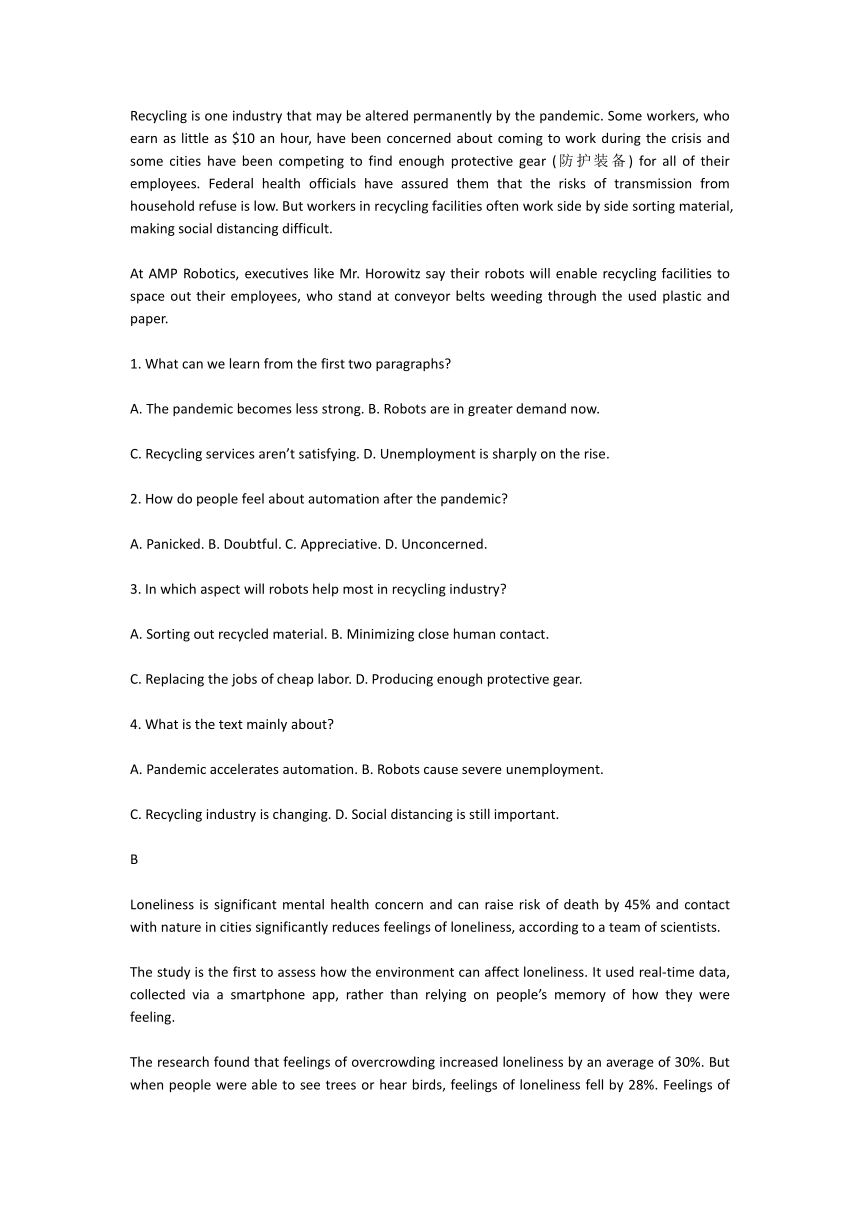牛津译林版(2019)必修二 unit1 Lights,camera,action! 单元基础小练习(有答案)
文档属性
| 名称 | 牛津译林版(2019)必修二 unit1 Lights,camera,action! 单元基础小练习(有答案) |

|
|
| 格式 | zip | ||
| 文件大小 | 15.3KB | ||
| 资源类型 | 教案 | ||
| 版本资源 | 牛津译林版(2019) | ||
| 科目 | 英语 | ||
| 更新时间 | 2022-10-07 00:00:00 | ||
图片预览



文档简介
高中英语牛津译林版必修二 unit1 单元基础小练习
一、词汇变形
1.horror n.恐怖电影(或故事等);震惊,恐惧→_________adj.可怕的;令人恐惧的
2.brief adj.简洁的,简单的;短时间的→_________ adv.简洁地,简单地
3.attach vt.认为有重要性,重视;把……固定,附上→_________n.附件;附属物;依恋→_________adj.依恋的;爱慕的;附属的
4.frequently adv.频繁地,经常→_________adj.频繁的,经常的→_________ n.频率,频繁
5.prefer vt.较喜欢,更喜欢→_________ n.偏爱;优先权;偏爱的事物
6.creative adj.创造性的,创作的;有创造力的→_________ v.创造;创作;产生→_________n.创造;创建;作品→_________n.创造者,创作者;造物主
7.revise vt.改变,修改;修订;复习→_________ n.复习
8.historian n.史学工作者,历史学家→_________ n.历史→_________ adj.有关历史的→_________ adj.有历史意义的
9.perform vt.做,履行;表演 vi.工作,运转;表演→_________n.表演;表现;执行→_________n.演员;表演者
10.location n.外景拍摄地;地方,地点→_________ v.把……安置在;确定……的位置
11.adapt vt.改编,改写;使适应 vi.适应→_________ n.改编本;适应→_________adj.可改编的;能适应的
12.solution n.解决方法,处理手段;答案→_________ v.解决;处理
二、重点短语
1.__________________科幻电影(或小说等)
2.__________________在后台,在幕后
3.__________________更不用说,且不说
4.__________________恰当处理(某人或某事);公平对待(某人或某事),给予公正的评价
5.__________________除……以外(还)
6.__________________停车,停止
7.__________________大量的
8.__________________发生
9.__________________对……熟悉
10.__________________认为……十分重要
11.__________________与……分开
12.__________________促成,导致
13.__________________努力做……
14.__________________为了……
三、阅读理解
A
Now, an increasing number of cities are suspending recycling services, partly out of fear that workers might contact the coronavirus from one another while sorting through used water bottles, food containers and boxes. One solution: Let robots do the job.
Since the coronavirus took hold in the United States last month, AMP Robotics has seen a “significant” increase in orders for its robots that use artificial intelligence to sort through recycled material, and weed out trash. Some facilities that were looking at getting one or two robots are now saying, “We need quite a bit more.” The Colorado company’s chief executive, Matanya Horowitz said, “It’s all moving quite fast.”
Before the pandemic, automation had been gradually replacing human work in a range of jobs, from call centers to warehouses and grocery stores, as companies looked to cut labor costs and improve profit.
But labor and robotics experts say social-distancing directives, which are likely to continue in some form after the crisis become less strong, could cause more industries to accelerate their use of automation. And long-lasting worries about job losses or a broad unease about having machines control vital aspects of daily life could disappear as society sees the benefits of restructuring workplaces in ways that minimize close human contact.
Recycling is one industry that may be altered permanently by the pandemic. Some workers, who earn as little as $10 an hour, have been concerned about coming to work during the crisis and some cities have been competing to find enough protective gear (防护装备) for all of their employees. Federal health officials have assured them that the risks of transmission from household refuse is low. But workers in recycling facilities often work side by side sorting material, making social distancing difficult.
At AMP Robotics, executives like Mr. Horowitz say their robots will enable recycling facilities to space out their employees, who stand at conveyor belts weeding through the used plastic and paper.
1. What can we learn from the first two paragraphs
A. The pandemic becomes less strong. B. Robots are in greater demand now.
C. Recycling services aren’t satisfying. D. Unemployment is sharply on the rise.
2. How do people feel about automation after the pandemic
A. Panicked. B. Doubtful. C. Appreciative. D. Unconcerned.
3. In which aspect will robots help most in recycling industry
A. Sorting out recycled material. B. Minimizing close human contact.
C. Replacing the jobs of cheap labor. D. Producing enough protective gear.
4. What is the text mainly about
A. Pandemic accelerates automation. B. Robots cause severe unemployment.
C. Recycling industry is changing. D. Social distancing is still important.
B
Loneliness is significant mental health concern and can raise risk of death by 45% and contact with nature in cities significantly reduces feelings of loneliness, according to a team of scientists.
The study is the first to assess how the environment can affect loneliness. It used real-time data, collected via a smartphone app, rather than relying on people’s memory of how they were feeling.
The research found that feelings of overcrowding increased loneliness by an average of 30%. But when people were able to see trees or hear birds, feelings of loneliness fell by 28%. Feelings of social inclusion also cut loneliness by 21% and when these feelings coincided (巧合) with contact with nature, the beneficial effect was boosted by a further 18%.
The findings pointed to interventions to reduce loneliness. The researchers said, “Specific measures that increase social inclusion and contact with nature should be taken, especially in thickly populated cities.” Time spent in nature is known to boost well-being, with woodland walks estimated to save the UK at least £185m a year in mental health costs, for example.
The research collected data from urban citizens across the world using the Urban Mind research app. More than 750 people provided 16,600 of these assessments. The participants were self-selecting and so it did not provide a representative sample of the wider populations. But when the researchers took age, education, and occupation into account, the benefits of nature contact and feelings of social inclusion on loneliness remained strongly statistically significant. Johanna Gibbons, part of the research team, said, “Cities are probably the only habitat that is increasing at a high rate. So we should be creating urban habitats where people can thrive (兴旺).”
1. How was the research conducted
A. By relying on people’s memory.
B. By surveying 750 urban participants.
C. By collecting data through a smartphone app.
D. By checking a worldwide representative sample.
2. What can we learn from Paragraph 4
A. Many big cities take the lead in the research.
B. Time spent indoors improves people’s well-being.
C. Woodland walks greatly reduce social contact with people.
D. Interventions to reduce loneliness benefit the UK financially.
3. What can be inferred about the research
A. It offers a wide range of samples globally.
B. The findings are statistically remarkable.
C. The carefully selected participants are reliable.
D. Many factors are considered except education.
4. What’s the text mainly about
A. The mental problems of living in big cities.
B. Developing urban habitats at a high speed.
C. Research on how to get rid of loneliness in nature.
D. Reducing loneliness in cities via contact with nature.
三、写作:
假设你是晨光中学的李津。我市为外国友人提供生活信息的某英文网站新增了 《最美中华》栏目,请你给该栏目投稿,介绍一个国内你喜欢或去过的地方。内容包括:
(1)该地方的基本情况(如名称、地理位置等);
(2)该地方的特色(如文化、景点等);
(3)你对该地方的印象和感受。
注意:(1)词数不少于100;
(2)可适当加入细节,使内容充实、行文连贯。
____________________________________________________________________________________________________________________________________________________________________________________________________________________________________________________________________________________________________________________________________________________________________________________________________________________________________________________________________________________________________________________________________________________________________________________________________________________________________________________________________
答案:
一、词汇变形
1.horror n.恐怖电影(或故事等);震惊,恐惧→horrible adj.可怕的;令人恐惧的
2.brief adj.简洁的,简单的;短时间的→briefly adv.简洁地,简单地
3.attach vt.认为有重要性,重视;把……固定,附上→attachment n.附件;附属物;依恋→attached adj.依恋的;爱慕的;附属的
4.frequently adv.频繁地,经常→frequent adj.频繁的,经常的→frequency n.频率,频繁
5.prefer vt.较喜欢,更喜欢→preference n.偏爱;优先权;偏爱的事物
6.creative adj.创造性的,创作的;有创造力的→create v.创造;创作;产生→creation n.创造;创建;作品→creator n.创造者,创作者;造物主
7.revise vt.改变,修改;修订;复习→revision n.复习
8.historian n.史学工作者,历史学家→history n.历史→historical adj.有关历史的→historic adj.有历史意义的
9.perform vt.做,履行;表演 vi.工作,运转;表演→performance n.表演;表现;执行→performer n.演员;表演者
10.location n.外景拍摄地;地方,地点→locate v.把……安置在;确定……的位置
11.adapt vt.改编,改写;使适应 vi.适应→adaptation n.改编本;适应→adaptable adj.可改编的;能适应的
12.solution n.解决方法,处理手段;答案→solve v.解决;处理
二、重点短语
1.science fiction科幻电影(或小说等)
2.behind the scenes在后台,在幕后
3.not to mention更不用说,且不说
4.do justice to恰当处理(某人或某事);公平对待(某人或某事),给予公正的评价
5.in addition to除……以外(还)
6.pull up停车,停止
7.a huge amount of大量的
8.take place发生
9.be familiar with对……熟悉
10.attach great importance to认为……十分重要
11.separate from...与……分开
12.contribute to促成,导致
13.make efforts to do...努力做……
14.in order to为了……
阅读
A篇【答案】B C B A
B篇 答案】 C D D D
写作
A Beautiful Place in China
March 19, 2021
By Li Jin
Sichuan Province is located in southwestern part of China. It enjoys many world-famous places of interest, such as Jiuzhaigou and Dujiangyan Irrigation project.
Jiuzhaigou National Park is a nature reserve in the north of Sichuan Province. What is the most impressive is its many multi-level waterfalls and colorful lakes. What’s more , walking in the nature reserve, you have a chance to see rare animals like giant pandas, golden monkeys. There are also many species of rare plants protected here. Another famous scenic spot is Dujiangyan Irrigation Project. It dates from over 2,000 years ago. However, it is still playing an important part in irrigation today.
I’m sure the visitors will be amazed by the beautiful scenery in Jiazhaigou as well as the construction Dujiangyan Irrigation Project.
一、词汇变形
1.horror n.恐怖电影(或故事等);震惊,恐惧→_________adj.可怕的;令人恐惧的
2.brief adj.简洁的,简单的;短时间的→_________ adv.简洁地,简单地
3.attach vt.认为有重要性,重视;把……固定,附上→_________n.附件;附属物;依恋→_________adj.依恋的;爱慕的;附属的
4.frequently adv.频繁地,经常→_________adj.频繁的,经常的→_________ n.频率,频繁
5.prefer vt.较喜欢,更喜欢→_________ n.偏爱;优先权;偏爱的事物
6.creative adj.创造性的,创作的;有创造力的→_________ v.创造;创作;产生→_________n.创造;创建;作品→_________n.创造者,创作者;造物主
7.revise vt.改变,修改;修订;复习→_________ n.复习
8.historian n.史学工作者,历史学家→_________ n.历史→_________ adj.有关历史的→_________ adj.有历史意义的
9.perform vt.做,履行;表演 vi.工作,运转;表演→_________n.表演;表现;执行→_________n.演员;表演者
10.location n.外景拍摄地;地方,地点→_________ v.把……安置在;确定……的位置
11.adapt vt.改编,改写;使适应 vi.适应→_________ n.改编本;适应→_________adj.可改编的;能适应的
12.solution n.解决方法,处理手段;答案→_________ v.解决;处理
二、重点短语
1.__________________科幻电影(或小说等)
2.__________________在后台,在幕后
3.__________________更不用说,且不说
4.__________________恰当处理(某人或某事);公平对待(某人或某事),给予公正的评价
5.__________________除……以外(还)
6.__________________停车,停止
7.__________________大量的
8.__________________发生
9.__________________对……熟悉
10.__________________认为……十分重要
11.__________________与……分开
12.__________________促成,导致
13.__________________努力做……
14.__________________为了……
三、阅读理解
A
Now, an increasing number of cities are suspending recycling services, partly out of fear that workers might contact the coronavirus from one another while sorting through used water bottles, food containers and boxes. One solution: Let robots do the job.
Since the coronavirus took hold in the United States last month, AMP Robotics has seen a “significant” increase in orders for its robots that use artificial intelligence to sort through recycled material, and weed out trash. Some facilities that were looking at getting one or two robots are now saying, “We need quite a bit more.” The Colorado company’s chief executive, Matanya Horowitz said, “It’s all moving quite fast.”
Before the pandemic, automation had been gradually replacing human work in a range of jobs, from call centers to warehouses and grocery stores, as companies looked to cut labor costs and improve profit.
But labor and robotics experts say social-distancing directives, which are likely to continue in some form after the crisis become less strong, could cause more industries to accelerate their use of automation. And long-lasting worries about job losses or a broad unease about having machines control vital aspects of daily life could disappear as society sees the benefits of restructuring workplaces in ways that minimize close human contact.
Recycling is one industry that may be altered permanently by the pandemic. Some workers, who earn as little as $10 an hour, have been concerned about coming to work during the crisis and some cities have been competing to find enough protective gear (防护装备) for all of their employees. Federal health officials have assured them that the risks of transmission from household refuse is low. But workers in recycling facilities often work side by side sorting material, making social distancing difficult.
At AMP Robotics, executives like Mr. Horowitz say their robots will enable recycling facilities to space out their employees, who stand at conveyor belts weeding through the used plastic and paper.
1. What can we learn from the first two paragraphs
A. The pandemic becomes less strong. B. Robots are in greater demand now.
C. Recycling services aren’t satisfying. D. Unemployment is sharply on the rise.
2. How do people feel about automation after the pandemic
A. Panicked. B. Doubtful. C. Appreciative. D. Unconcerned.
3. In which aspect will robots help most in recycling industry
A. Sorting out recycled material. B. Minimizing close human contact.
C. Replacing the jobs of cheap labor. D. Producing enough protective gear.
4. What is the text mainly about
A. Pandemic accelerates automation. B. Robots cause severe unemployment.
C. Recycling industry is changing. D. Social distancing is still important.
B
Loneliness is significant mental health concern and can raise risk of death by 45% and contact with nature in cities significantly reduces feelings of loneliness, according to a team of scientists.
The study is the first to assess how the environment can affect loneliness. It used real-time data, collected via a smartphone app, rather than relying on people’s memory of how they were feeling.
The research found that feelings of overcrowding increased loneliness by an average of 30%. But when people were able to see trees or hear birds, feelings of loneliness fell by 28%. Feelings of social inclusion also cut loneliness by 21% and when these feelings coincided (巧合) with contact with nature, the beneficial effect was boosted by a further 18%.
The findings pointed to interventions to reduce loneliness. The researchers said, “Specific measures that increase social inclusion and contact with nature should be taken, especially in thickly populated cities.” Time spent in nature is known to boost well-being, with woodland walks estimated to save the UK at least £185m a year in mental health costs, for example.
The research collected data from urban citizens across the world using the Urban Mind research app. More than 750 people provided 16,600 of these assessments. The participants were self-selecting and so it did not provide a representative sample of the wider populations. But when the researchers took age, education, and occupation into account, the benefits of nature contact and feelings of social inclusion on loneliness remained strongly statistically significant. Johanna Gibbons, part of the research team, said, “Cities are probably the only habitat that is increasing at a high rate. So we should be creating urban habitats where people can thrive (兴旺).”
1. How was the research conducted
A. By relying on people’s memory.
B. By surveying 750 urban participants.
C. By collecting data through a smartphone app.
D. By checking a worldwide representative sample.
2. What can we learn from Paragraph 4
A. Many big cities take the lead in the research.
B. Time spent indoors improves people’s well-being.
C. Woodland walks greatly reduce social contact with people.
D. Interventions to reduce loneliness benefit the UK financially.
3. What can be inferred about the research
A. It offers a wide range of samples globally.
B. The findings are statistically remarkable.
C. The carefully selected participants are reliable.
D. Many factors are considered except education.
4. What’s the text mainly about
A. The mental problems of living in big cities.
B. Developing urban habitats at a high speed.
C. Research on how to get rid of loneliness in nature.
D. Reducing loneliness in cities via contact with nature.
三、写作:
假设你是晨光中学的李津。我市为外国友人提供生活信息的某英文网站新增了 《最美中华》栏目,请你给该栏目投稿,介绍一个国内你喜欢或去过的地方。内容包括:
(1)该地方的基本情况(如名称、地理位置等);
(2)该地方的特色(如文化、景点等);
(3)你对该地方的印象和感受。
注意:(1)词数不少于100;
(2)可适当加入细节,使内容充实、行文连贯。
____________________________________________________________________________________________________________________________________________________________________________________________________________________________________________________________________________________________________________________________________________________________________________________________________________________________________________________________________________________________________________________________________________________________________________________________________________________________________________________________________
答案:
一、词汇变形
1.horror n.恐怖电影(或故事等);震惊,恐惧→horrible adj.可怕的;令人恐惧的
2.brief adj.简洁的,简单的;短时间的→briefly adv.简洁地,简单地
3.attach vt.认为有重要性,重视;把……固定,附上→attachment n.附件;附属物;依恋→attached adj.依恋的;爱慕的;附属的
4.frequently adv.频繁地,经常→frequent adj.频繁的,经常的→frequency n.频率,频繁
5.prefer vt.较喜欢,更喜欢→preference n.偏爱;优先权;偏爱的事物
6.creative adj.创造性的,创作的;有创造力的→create v.创造;创作;产生→creation n.创造;创建;作品→creator n.创造者,创作者;造物主
7.revise vt.改变,修改;修订;复习→revision n.复习
8.historian n.史学工作者,历史学家→history n.历史→historical adj.有关历史的→historic adj.有历史意义的
9.perform vt.做,履行;表演 vi.工作,运转;表演→performance n.表演;表现;执行→performer n.演员;表演者
10.location n.外景拍摄地;地方,地点→locate v.把……安置在;确定……的位置
11.adapt vt.改编,改写;使适应 vi.适应→adaptation n.改编本;适应→adaptable adj.可改编的;能适应的
12.solution n.解决方法,处理手段;答案→solve v.解决;处理
二、重点短语
1.science fiction科幻电影(或小说等)
2.behind the scenes在后台,在幕后
3.not to mention更不用说,且不说
4.do justice to恰当处理(某人或某事);公平对待(某人或某事),给予公正的评价
5.in addition to除……以外(还)
6.pull up停车,停止
7.a huge amount of大量的
8.take place发生
9.be familiar with对……熟悉
10.attach great importance to认为……十分重要
11.separate from...与……分开
12.contribute to促成,导致
13.make efforts to do...努力做……
14.in order to为了……
阅读
A篇【答案】B C B A
B篇 答案】 C D D D
写作
A Beautiful Place in China
March 19, 2021
By Li Jin
Sichuan Province is located in southwestern part of China. It enjoys many world-famous places of interest, such as Jiuzhaigou and Dujiangyan Irrigation project.
Jiuzhaigou National Park is a nature reserve in the north of Sichuan Province. What is the most impressive is its many multi-level waterfalls and colorful lakes. What’s more , walking in the nature reserve, you have a chance to see rare animals like giant pandas, golden monkeys. There are also many species of rare plants protected here. Another famous scenic spot is Dujiangyan Irrigation Project. It dates from over 2,000 years ago. However, it is still playing an important part in irrigation today.
I’m sure the visitors will be amazed by the beautiful scenery in Jiazhaigou as well as the construction Dujiangyan Irrigation Project.
